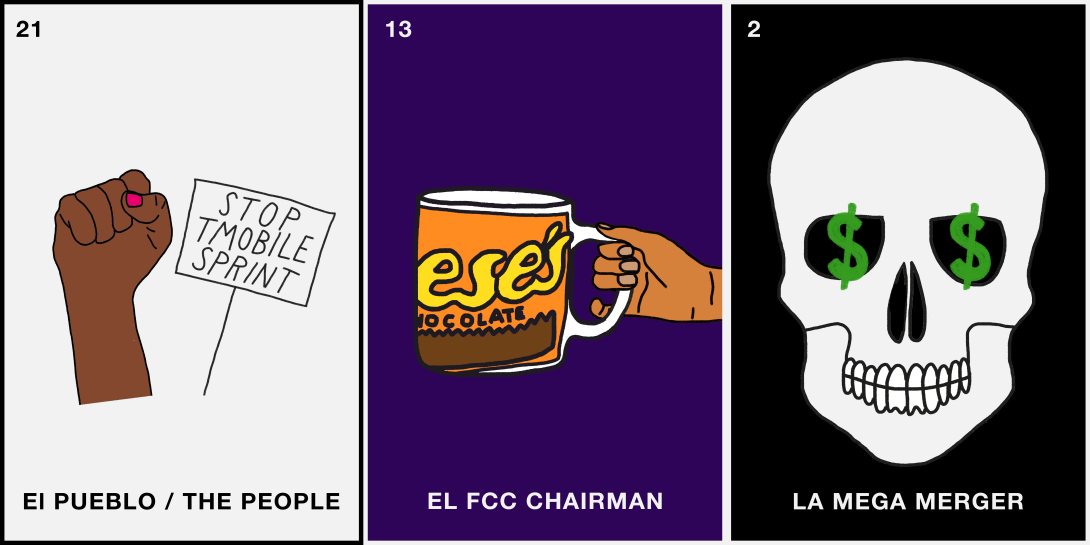T-Mobile's Shrinking Chances in Its Sprint-Merger Gamble

Dayanita Ramesh @ Free Press
In lotería, the Mexican version of bingo, winners call out “lotería!” when they get four cards in a row.
But John Legere, T-Mobile’s insufferable CEO, hasn’t been yelling lotería this week. In fact, it’s been no bueno for him. And that’s actually great news for wireless customers who rely on more affordable plans from T-Mobile and Sprint, and who’d suffer if this bad deal did go through.
This week, 10 state attorneys general, led by New York’s and California’s, sued to block the disastrous merger — which would leave us with just three national wireless carriers if the deal goes through — because it violates the nation’s antitrust laws. The AGs rightly reasoned that combining these two rivals would result in “immediate and permanent harm to competition and consumers,” and especially to low-income people who rely on prepaid wireless services as their primary or only way to access the internet.
They noted that this merger is part of T-Mobile’s “long-term plan to increase prices and reduce competition,” explaining that none of the company’s concessions or commitments intended to grease the skids for deal approval would change these facts.
This card draw is very important in the fight to prevent these harms, because even if the FCC and U.S. Department of Justice line up to approve the acquisition, the states’ lawsuit likely stops it cold for now — and could block this mega merger permanently.
The T-Mobile/Sprint merger would cause irreplaceable harm to millions of subscribers nationwide, particularly affecting low-income & communities of color.
— NY AG James (@NewYorkStateAG) June 11, 2019
It’s exactly the sort of consumer-harming, job-killing megamerger our antitrust laws were designed to prevent. #MegaBlock pic.twitter.com/XfO68fShoy
So how did we get here?
Before we get to this week’s great news from the state AGs, let’s take a step back and review the other cards that turned up:
The FCC: the agency tasked with determining whether the merger serves the public interest
In May, Trump-appointed FCC Chairman Ajit Pai came out in support of the merger, saying he would approve it based on getting certain conditions and commitments in place. Yet Free Press and other groups have pointed out merger conditions are always hard to enforce and get right, and the “promises” Pai got from T-Mobile are entirely inadequate to offset the deal’s many harms.
Normally, the FCC doesn’t go first on merger reviews, and waits to coordinate with federal antitrust enforcers from the DoJ or the Federal Trade Commission. But this time the FCC leaped out ahead — and there’s no reason to think it actually did the analysis to support the bogus claim that the deal would help wireless users instead of hurting them.
The Justice Department: the agency tasked with reviewing whether the merger is anti-competitive
According to a slew of press reports, career staff at the DoJ — the attorneys and economists who analyze these deals for a living and typically work for multiple presidential administrations — have suggested blocking the deal.
Meanwhile, those same stories say that Assistant Attorney General Makan Delrahim may be looking for a way to make the deal work by asking the companies to divest more holdings than the FCC did. Delrahim is also reportedly considering a ridiculous plan to create a new national wireless competitor out of the scraps Sprint leaves behind.
Where does this leave the people this mega merger would directly affect?
Public outcry
Activists have been calling Congress, the DoJ, the FCC and the state attorneys general leading this lawsuit — and public-interest groups like Free Press met with staff members working for those state attorneys generals to make the definitive case for blocking the deal. Thanks to all of this pressure, we’re giving John Legere and T-Mobile a run for their money and seriously denting their chances for victory.
The public has pushed back since the merger was announced over a year ago. Activists showed up at California Public Utility Commission hearings to urge regulators to reject the deal. In the days leading up to Halloween, they dressed up in costumes and protested outside T-Mobile stores around the country. They generated over 60,000 signatures urging the FCC to reject the merger, then made those calls to voice their opinions again.
And all of this pressure is working! There are cards still unrevealed, but we’re closer to beating back this deal and stopping T-Mobile’s and Sprint’s executives from cashing in at everyone else’s expense.
It isn’t over yet, and we still need you to help us push the U.S. Department of Justice to follow the states’ lead. Call regulators there at 202-804-1389 and urge them to reject the merger.